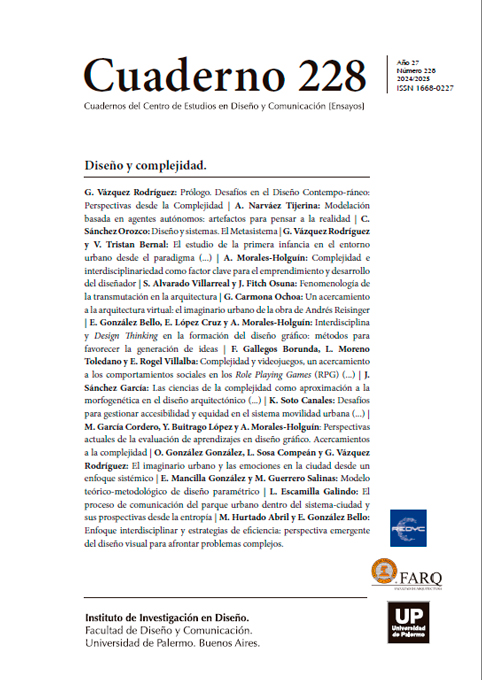Complejidad y videojuegos, un acercamiento a los comportamientos sociales en los Role Playing Games (RPG) a través de la programación
Résumé
La complejidad presente en nuestro entorno actual se ve usualmente reflejada en los productos culturales, entre ellos, los producidos por el diseño y los medios lúdicos, como lo son el cine y el videojuego, en este último es posible observar la transición de los sistemas sociales y su complejidad en juegos de mundo abierto, como el caso de Second life y en diversos juegos del tipo RPG (Role Playing Game), en los cuales se replican narrativas complejas propias de nuestro entorno social.
Références
Adams, T. X. S., Tarn (Ed.). (2019). Procedural Storytelling in Game Design. A K Peters/ CRC Press. https://doi.org/10.1201/9780429488337
Boeda, G. (2021). Multi-Agent Cooperation in Games with Goal Oriented Action Planner: Use Case in WONDER Prototype Project. Proceedings of the AAAI Conference on Artificial Intelligence and Interactive Digital Entertainment, 17(1), 204–207. https://doi.org/10.1609/aiide.v17i1.18909
Butt, N. A., Mahmood, Z., Rehman, G. U., Nasralla, M. M., Zubair, M., Farman, H., & Khattak, S. B. A. (2023). The Development of Intelligent Agents: A Case-Based Reasoning Approach to Achieve Human-Like Peculiarities via Playback of Human Traces. IEEE Access, 11, 78693–78712. https://doi.org/10.1109/ACCESS.2023.3274740
Cook, M. (2020). Generative Forensics: Procedural Generation and Information Games (arXiv:2004.01768). arXiv. https://doi.org/10.48550/arXiv.2004.01768
Deleuze, G., Guattari, F., & Deleuze, G. (2002). Mil mesetas: Capitalismo y esquizofrenia (5. ed). Pre-Textos.
Garavaglia, F., Nobre, R. A., Ripamonti, L. A., Maggiorini, D., & Gadia, D. (2022). Moody5: Personality-biased agents to enhance interactive storytelling in video games. 2022 IEEE Conference on Games (CoG), 175–182. https://doi.org/10.1109/CoG51982.2022.9893689
Guimarães, M., Santos, P. A., & Jhala, A. (2023). Emergent social NPC interactions in the Social NPCs Skyrim mod and beyond (arXiv:2207.13398). arXiv. https://doi.org/10.48550/arXiv.2207.13398
Gumin, M. (2016). Wave Function Collapse Algorithm (1.0) [C#]. https://github.com/mxgmn/WaveFunctionCollapse (Obra original publicada en 2016)
Jager, W., Abramczuk, K., Komendant-Brodowska, A., Baczko-Dombi, A., Fecher, B., Sokolovska, N., & Spits, T. (2020). Looking into the Educational Mirror: Why Computation Is Hardly Being Taught in the Social Sciences, and What to Do About It. En H. Verhagen, M. Borit, G. Bravo, & N. Wijermans (Eds.), Advances in Social Simulation (pp. 239–245). Springer International Publishing. https://doi.org/10.1007/978-3-030-34127-5_22
Johnson-Bey, S., Nelson, M. J., & Mateas, M. (2022a). Exploring the Design Space of Social Physics Engines in Games. En M. Vosmeer & L. Holloway-Attaway (Eds.), Interactive Storytelling (Vol. 13762, pp. 559–576). Springer International Publishing. https://doi.org/10.1007/978-3-031-22298-6_36
Majewski, J. (2003). Theorising Videogame Narrative. Australia: Bond University.
McGonigal, J. (2011). Reality is broken: Why games make us better and how they can change the world (Ed. with a new, 2. appendix). Penguin Press.
Morales, A.; Cabrera, V. (2017). Debate teórico-metodológico sobre diseño gráfico: de la linealidad a la complejidad. Intersticios sociales, (13) Recuperado en 01 de abril de 2024, de http://www.scielo.org.mx/scielo.php?script=sci_arttext&pid=S2007-49642017000100002&lng=es&tlng=es
Nigel, G., & Klaus, T. (2005). Simulation For The Social Scientist. McGraw-Hill Education (UK).
Origlia, A., Cutugno, F., Rodà, A., Cosi, P., & Zmarich, C. (2019). FANTASIA: A framework for advanced natural tools and applications in social, interactive approaches. Multimedia Tools and Applications, 78(10), 13613–13648. https://doi.org/10.1007/s11042-019-7362-5
Picucci, M. (2014). When Video Games Tell Stories: A Model of Video Game Narrative Architectures. https://gredos.usal.es/handle/10366/124953
Poole, S. (2007). Trigger Happy, Videogames and the Entertaiment Revolution. USA: Self Published.
Samuel, B., Reed, A. A., Maddaloni, P., Mateas, M., & Wardrip-Fruin, N. (2015). The Scored Rule Engine: Next-Generation Social Physics. International Conference on Foundations of Digital Games. https://www.semanticscholar.org/paper/The-Scored-Rule-Engine%3ANext-Generation-Social-Samuel-Reed/94b7e4a02b33740d8d589ec726c6dd28219c65f7
Shirvani, A., Ware, S. G., & Baker, L. J. (2023). Personality and Emotion in Strong-Story Narrative Planning. IEEE Transactions on Games, 15(4), 669–682. https://doi.org/10.1109/TG.2022.3227220
Starke, S., Zhang, H., Komura, T., & Saito, J. (2019). Neural state machine for characterscene interactions. ACM Transactions on Graphics, 38(6), 209:1-209:14. https://doi.org/10.1145/3355089.3356505
Thakara, J. (2010). Diseñando para un mundo complejo. Acciones para lograr la sustentabilidad. México: Editorial Designio.
Los autores/as que publiquen en esta revista ceden los derechos de autor y de publicación a "Cuadernos del Centro de Estudios de Diseño y Comunicación", Aceptando el registro de su trabajo bajo una licencia de atribución de Creative Commons, que permite a terceros utilizar lo publicado siempre que de el crédito pertinente a los autores y a esta revista.


